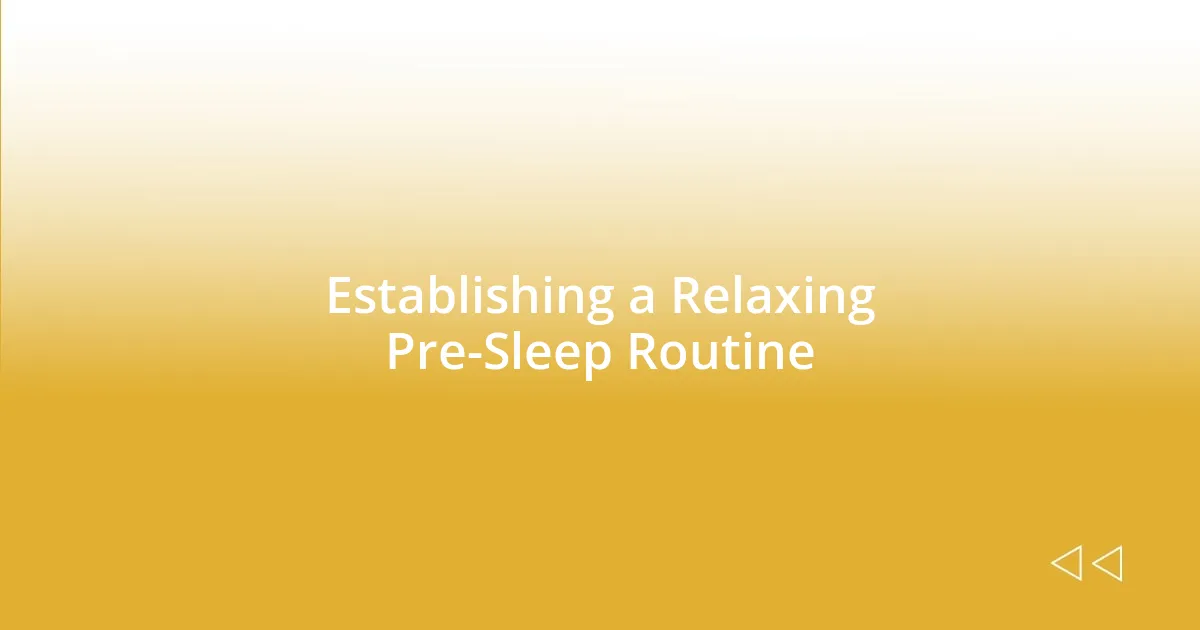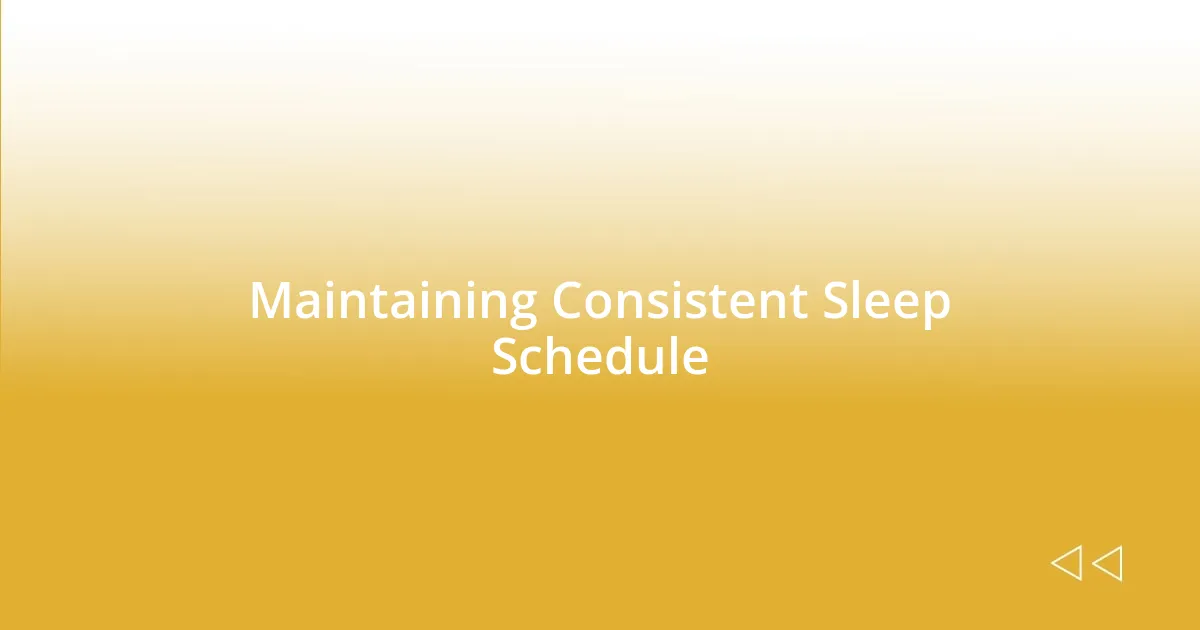Key takeaways:
- Establishing good sleep hygiene practices, such as a consistent sleep schedule and a relaxing pre-sleep routine, significantly improves both sleep quality and overall well-being.
- Creating a conducive sleep environment, including adjusting lighting, reducing noise, and controlling temperature, enhances restful sleep.
- Managing stress through journaling, mindfulness meditation, and avoiding late-night worry sessions promotes better sleep quality.
- Reflecting on personal sleep habits and making small changes, like minimizing screen time and caffeine intake, can lead to marked improvements in mood and energy levels.

Understanding Sleep Hygiene Basics
Sleep hygiene is all about establishing habits that promote restful sleep. I’ve found that simple practices can make a world of difference—like maintaining a consistent sleep schedule. Have you ever noticed how your mood shifts when you get just one bad night of sleep? It’s a reminder of how connected our rest is to our overall well-being.
Creating the right sleep environment is equally crucial. I remember when I switched from bright overhead lights to softer lamp lighting before bed; it was like flipping a switch for my mind. Isn’t it fascinating how something so simple can prepare us for sleep and signal our brains that it’s time to unwind?
Then there’s the impact of screens on our sleep quality. I used to scroll through my phone before bed without a second thought, but I realized how it left me feeling restless. Have you ever laid awake, replaying videos in your mind? A good rule of thumb is to aim for at least 30 minutes of screen-free time before sleep. In my experience, this small adjustment can pave the way for a more peaceful night’s rest.

Importance of Sleep Hygiene
Sleep hygiene holds tremendous importance for our overall health and well-being. When I prioritize good sleep habits, I often notice a direct correlation with my energy levels throughout the day. It’s truly eye-opening how simply ensuring a quiet and dark room can help me wake up feeling refreshed. Have you ever thought about the impact of just a few extra hours of quality sleep on your productivity? It’s remarkable how much more focused I feel after a solid night’s rest.
The consequences of neglecting sleep hygiene can be severe, affecting both mental and physical health. I vividly recall a period in my life when sleep wasn’t a priority; I was constantly fatigued and more prone to stress. It’s scary how poor sleep can cloud your judgment and heighten anxiety. Reflecting on those days, I’ve learned that establishing bedtime rituals can significantly improve not only my sleep quality but also my mood the next day.
Incorporating sleep hygiene into my daily routine is not just a recommendation; it’s transformed my lifestyle. I often share with friends that even small changes, like a consistent wake-up time and minimizing caffeine in the afternoon, have made a remarkable difference. What changes have you considered making in your own sleep routine? Trust me, it’s worth experimenting to find what best supports your sleep health.
| Aspect | Impact of Good Sleep Hygiene |
|---|---|
| Physical Health | Enhanced immune function and recovery |
| Mental Clarity | Improved focus, concentration, and decision-making skills |
| Mood Regulation | Better emotional balance and reduced chances of irritability |
| Stress Management | Lower stress levels and heightened resilience |

Assessing Your Current Sleep Habits
Assessing your current sleep habits is a crucial step toward understanding how you can improve your overall sleep hygiene. I remember the time I decided to keep a sleep diary for a week. It opened my eyes to patterns I hadn’t noticed before, like how my caffeine consumption was often too close to bedtime. I began to see a distinct correlation between what I consumed during the day and how I felt come nightfall. This practice really helped me pinpoint my habits that were serving me and those that were holding me back.
Here are some questions to reflect on as you assess your sleep habits:
- What time do you usually go to bed and wake up?
- Do you have a consistent sleep schedule, or is it often varied?
- How long does it typically take you to fall asleep after you lie down?
- Do you wake up during the night? If so, how often?
- How do you feel when you wake up? Are you refreshed or groggy?
- Do you consume caffeine or alcohol before bed?
- How often do you engage with screens in the hour leading up to sleep?
Taking the time to answer these questions has a profound impact on gaining awareness of your sleep patterns.

Creating a Sleep-Conducive Environment
Creating a supportive sleep environment can change the way I feel about sleep entirely. I’ve found that a quiet space, free from distracting noises, helps me unwind after a long day. There’s something incredibly calming about knowing I can escape to a sanctuary where the outside world fades away, right?
Adjusting the lighting in my bedroom was another game-changer. I’ve learned that darkness signals my brain it’s time to rest. When I switched to blackout curtains, I couldn’t believe how much deeper my sleep became—like having my very own sleep cave! How would a cozy, dark room help you feel at night?
Temperature is also key for me. I remember a night when I was too hot to sleep, tossing and turning in frustration. After investing in lighter bedding and adjusting the thermostat, everything changed. A cool room sets the stage for restful slumber, and now I wake up feeling rejuvenated. Are you paying attention to the climate of your sleep space?

Establishing a Relaxing Pre-Sleep Routine
One of my favorite parts of my pre-sleep routine involves practicing relaxation techniques. I often find myself winding down by doing some gentle stretches or meditative breathing before bed. It’s fascinating how just a few minutes of deep breathing can quiet my mind and shift my body into relaxation mode. Have you experienced that moment when a stressful day is finally put to rest?
I also dedicate about 30 minutes to enjoying a good book. It serves as a perfect distraction from daily stressors. I remember a time when I used to scroll through my phone before bed, which only made me feel more wired. Now, I savor the pages of a novel, allowing the story to carry me away, and I feel my eyelids grow heavier with every chapter. Could swapping screens for a book be the simple change that helps you unwind?
Finally, I’ve learned to say goodbye to heavy meals in the evening. I used to indulge in late-night snacking, thinking it would help soothe me to sleep, but I soon realized it was just the opposite. I remember nights of tossing and turning, my stomach feeling uneasy. By keeping my dinner light and focusing on sleep-friendly foods, like whole grains and bananas, I’ve noticed a marked improvement. Have you thought about what you eat before sleep and how it affects your rest?

Managing Stress for Better Sleep
Managing stress is crucial for achieving the restful sleep we all crave. I’ve noticed that keeping a journal helps me immensely. Each night, I take a few minutes to jot down my thoughts and worries from the day. This simple act of recording my feelings helps clear the mental clutter that often keeps me awake, paving the way for a more restful night. Have you ever tried writing down your thoughts before bed?
On particularly stressful days, I’ve found that practicing mindfulness meditation is a powerful tool. It’s intriguing how just a few moments of focused breathing can transform my anxiety into calmness. I remember a night when my mind raced with all the tasks ahead; just fifteen minutes of mindful breathing made me feel grounded and ready for sleep. Can you recall a time when a calming practice changed your mood dramatically?
One technique that I champion is not overthinking my to-do list right before bed. I used to review my day, running through everything I hadn’t accomplished. That habit kept me awake and anxious. Now, I remind myself that tomorrow is another opportunity. I set aside my tasks by mentally placing them in a “tomorrow” box, ensuring I can drift off with peace of mind. Have you experimented with shutting down your mental “to-do” before sleep?

Maintaining Consistent Sleep Schedule
Maintaining a consistent sleep schedule has been a game changer for me. I aim to go to bed and wake up at the same time every day, even on weekends. This habit helps regulate my body’s internal clock, making it easier to fall asleep and wake up feeling refreshed. Have you ever wondered how quickly your body adjusts to a routine?
I remember when I used to let my schedule fluctuate wildly, staying up late and sleeping in. What I didn’t realize then was how much that inconsistency impacted my energy levels and mood. After committing to a steady sleep pattern, I noticed that not only did falling asleep become easier, but I also felt sharper and more optimistic during the day. Can something as simple as time really have such a profound effect on our mental clarity?
Establishing this routine wasn’t always easy for me. Initially, it felt restrictive, especially on those weekends when late-night outings were tempting. However, I soon discovered that sticking to my schedule, even on those nights, meant more enjoyable days filled with energy and focus. I’ve come to value that feeling of waking up early, embracing the quiet moments before the day begins. What about you—have you challenged yourself to create a sleep schedule that aligns with your lifestyle?













